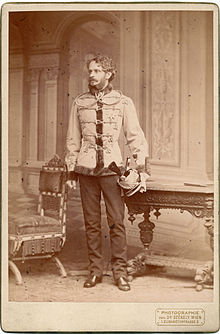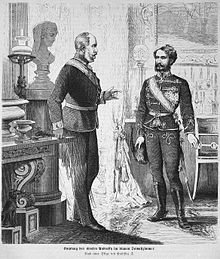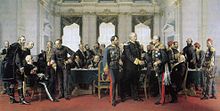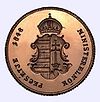- Gyula Andrássy
-
The native form of this personal name is csíkszentkirályi és krasznahorkai gróf Andrássy Gyula. This article uses the Western name order.
Gyula Andrássy 
Prime Minister of the Kingdom of Hungary In office
17 February 1867 – 14 November 1871
(4 years, 270 days)Preceded by Bertalan Szemere Succeeded by Menyhért Lónyay Foreign Minister of Austria-Hungary In office
14 November 1871 – 8 October 1879Preceded by Count Friedrich Ferdinand Beust Succeeded by Baron Heinrich Karl von Haymerle Personal details Born 3 March 1823
Oláhpatak, HungaryDied 18 February 1890 (aged 66)
Volosko, CroatiaNationality Hungarian Signature 
Gyula Count Andrássy de Csíkszentkirály et Krasznahorka (3 March 1823 – 18 February 1890) was a Hungarian statesman, who served as Prime Minister of Hungary (1867–1871) and subsequently as Foreign Minister of Austria-Hungary (1871–1879). He was sometimes called Count Julius Andrassy in English.
Contents
Biography
The son of Count Károly Andrássy and Etelka Szapáry, he was born in Oláhpatak (now in Rožňava District, Slovakia) in the then Kingdom of Hungary. The son of a liberal father who belonged to the political opposition, at a time when to be in oppose the government was very dangerous, Andrássy at a very early age threw himself into the political struggles of the day, adopting at the outset the patriotic side.
Count István Széchenyi was the first adequately to appreciate his capacity, when in 1845 the young man first began his public career as president of the society for the regulation of the waters of the Upper Tisza river.
In 1846, he attracted attention by his bitter articles against the government in Lajos Kossuth's paper, the Pesti Hírlap, and was returned as one of the Radical candidates to the diet of 1848, where his generous, impulsive nature made him one of the most thorough-going of the patriots.
When the Croats under Josip Jelačić attempted to return Međimurje, which was then part of Hungary, to Croatia, Andrássy placed himself at the head of the gentry of his county, and served with distinction at the battles of Pákozd and Schwechat, as Arthur Görgey's adjutant (1848).
Towards the end of the war Andrássy was sent to Constantinople by the revolutionary government to obtain at least the neutrality of Ottoman Empire during the struggle.
After the catastrophe of Világos he migrated first to London and then to Paris. On 21 September 1851 he was hanged in effigy by the Austrian government for his share in the Hungarian revolt.
He employed his ten years of exile in studying politics in what was then the centre of European diplomacy, and it is memorable that his keen eye detected the inherent weakness of the second French empire beneath its imposing exterior.
Andrássy returned home from exile in 1858, but his position was very difficult. He had never petitioned for an amnesty, steadily rejected all the overtures both of the Austrian government and of the Magyar Conservatives (who would have accepted something short of full autonomy), and clung enthusiastically to Ferenc Deák's party.
On 21 December 1865 he was chosen vice-president of the diet, and in March 1866 became president of the sub-committee appointed by the parliamentary commission to draw up the Composition (commonly known as the Austro-Hungarian Compromise of 1867) between Austria and Hungary, of which the central idea, that of the "Delegations," originated with him.
It was said at that time that he was the only member of the commission who could persuade the court of the justice of the national claims.
After the Battle of Königgrätz he was formally consulted by Emperor Franz Joseph for the first time. He advised the re-establishment of the constitution and the appointment of a responsible ministry.
On 17 February 1867 the king appointed him the first constitutional Hungarian premier. It was on this occasion that Ferenc Deák called him "the providential statesman given to Hungary by the grace of God."
As premier, Andrássy by his firmness, amiability and dexterity as a debater, soon won for himself a commanding position. Yet his position continued to be difficult, inasmuch as the authority of Deák dwarfed that of all the party leaders, however eminent.
Andrássy chose for himself the departments of war and foreign affairs. It was he who reorganized the Honvéd system (state army), and he used often to say that the regulation of the military border districts was the most difficult labour of his life.
On the outbreak of the Franco-Prussian War of 1870, Andrássy resolutely defended the neutrality of the Austrian monarchy, and in his speech on 28 July 1870 warmly protested against the assumption that it was in the interests of Austria to seek to recover the position she had held in Germany before 1863. On the fall of Beust (6 November 1871), Andrássy stepped into his place. His tenure of the chancellorship was epoch-making.
Hitherto the empire of the Habsburgs had never been able to dissociate itself from its Holy Roman traditions. But its loss of influence in Italy and Germany, and the consequent formation of the Dual State, had at length indicated the proper, and, indeed, the only field for its diplomacy in the future – the Near East, where the process of the crystallization of the Balkan peoples into nationalities was still incomplete. The question was whether these nationalities were to be allowed to become independent or were only to exchange the tyranny of the sultan for the tyranny of the tsar or the Habsburg emperor.
Hitherto Austria had been content either to keep out the Russians or share the booty with them. She was now, moreover, in consequence of her misfortunes deprived of most of her influence in the councils of Europe.
It was Andrassy who recovered for her proper place in the European concert. First he approached the German emperor; then more friendly relations were established with the courts of Italy and Russia by means of conferences at Berlin, Vienna, St Petersburg and Venice.
The "Andrássy Note"
The recovered influence of Austria was evident in the negotiations which followed the outbreak of serious disturbances in Bosnia in 1875.
The three courts of Vienna, Berlin and St Petersburg had come to an understanding as to their attitude in the Eastern question, and their views were embodied in the dispatch, known as the "Andrássy Note", sent on 30 December 1875 by Andrássy to Count Beust, the Austrian ambassador to the Court of St James.
In it he pointed out that the efforts of the powers to localize the revolt seemed in danger of failure, that the rebels were still holding their own, and that the Ottoman promises of reform, embodied in various firmans, were no more than vague statements of principle which had never had, and were probably not intended to have, any local application. In order to avert the risk of a general conflagration, therefore, he urged that the time had come for concerted action of the powers for the purpose of pressing the Porte to fulfil its promises.
A sketch of the more essential reforms followed: the recognition rather than the toleration of the Christian religion; the abolition of the system of farming the taxes; and, in Bosnia and Herzegovina, where the religious was complicated by an agrarian question, the conversion of the Christian peasants into free proprietors, to rescue them from their double subjection to the Muslim Ottoman landowners.
In Bosnia and Herzegovina elected provincial councils were to be established, life-term judges appointed and individual liberties guaranteed.
Finally, a mixed commission of Muslims and Christians was to be empowered to watch over the carrying out of these reforms.
The fact that the sultan would be responsible to Europe for the realization of his promises would serve to allay the natural suspicions of the insurgents. To this plan both Britain and France gave a general assent, and the Andrássy Note was adopted as the basis of negotiations.
When war became inevitable between Russia and the Porte, Andrássy arranged with the Russian court that, in case Russia prevailed, the status quo should not be changed to the detriment of the Austrian monarchy. When, however, the Treaty of San Stefano threatened a Russian hegemony in the Near East, Andrássy concurred with the German and British courts that the final adjustment of matters must be submitted to a European congress.
At the Congress of Berlin in 1878 he was the principal Austrian plenipotentiary, and directed his efforts to diminish the gains of Russia and aggrandize the Dual Monarchy. Before the Congress opened on 13 June, negotiations between Andrássy and the British Foreign Secretary Marquess of Salisbury had already "ended on 6 June by Britain agreeing to all the Austrian proposals relative to Bosnia-Herzegovina about to come before the congress while Austria would support British demands."[1]
In addition to the occupation and administration of Bosnia-Herzegovina, Andrássy also obtained the right to station garrisons in the Sanjak of Novi Pazar, which remained under Ottoman administration. The Sanjak preserved the separation of Serbia and Montenegro, and the Austro-Hungarian garrisons there would open the way for a dash to Salonika that "would bring the western half of the Balkans under permanent Austrian influence."[2] "High [Austro-Hungarian] military authorities desired [an ...] immediate major expedition with Salonika as its objective." [3]
This occupation was most unpopular in Hungary, both for financial reasons and because of the strong philo-Turk sentiments of the Magyars.
On 28 September 1878 the Finance Minister, Koloman von Zell, threatened to resign if the army, behind which stood the Archduke Albert, were allowed to advance to Salonika. In the session of the Hungarian Parliament of 5 November 1878 the Opposition proposed that the Foreign Minister should be impeached for violating the constitution by his policy during the Near East Crisis and by the occupation of Bosnia-Herzegovina. The motion was lost by 179 to 95. By the Opposition rank and file the gravest accusations were raised against Andrassy.[4]
On 10 October 1878 the French diplomat Melchior de Vogüé described the situation as follows:
Particularly in Hungary the dissatisfaction caused by this 'adventure' has reached the gravest proportions, prompted by that strong conservative instinct which animates the Magyar race and is the secret of its destinies. This vigorous and exclusive instinct explains the historical phenomenon of an isolated group, small in numbers yet dominating a country inhabited by a majority of peoples of different races and conflicting aspirations, and playing a role in European affairs out of all proportions to its numerical importance or intellectual culture. This instinct is to-day awakened and gives warning that it feels the occupation of Bosnia-Herzegovina to be a menace which, by introducing fresh Slav elements into the Hungarian political organism and providing a wider field and further recruitment of the Croat opposition, would upset the unstable equilibrium in which the Magyar domination is poised.[5]
Andrássy felt constrained to bow before the storm, and he placed his resignation in the emperor's hands (8 October 1879). The day before his retirement he signed the offensive-defensive alliance with Germany, which placed the foreign relations of Austria-Hungary once more on a stable footing.
Later life
After his retirement, Andrássy continued to take an active part in public affairs both in the Delegations and in the Upper House. In 1885 he warmly supported the project for the reform of the House of Magnates, but on the other hand he jealously defended the inviolability of the Composition of 1867, and on 5 March 1889 in his place in the Upper House spoke against any particularist tampering with the common army. In the last years of his life he regained his popularity, and his death on 18 February 1890, aged 66, was mourned as a national calamity. There is a plaque dedicated to him in the town of Volosko where he died (between Rijeka and Opatija in present-day Croatia). It is located just above the restaurant Amfora.
He was the first Magyar statesman who, for centuries, had occupied a European position. It has been said that he united in himself the Magyar magnate with the modern gentleman. His motto was: "It is hard to promise, but it is easy to perform." If Deák was the architect, Andrássy certainly was the master-builder of the modern Hungarian state.
Family
By his wife, the countess Katinka Kendeffy, whom he married in Paris in 1856, Count Andrássy left two sons, and one daughter, Ilona (b. 1859). Both the sons gained distinction in Hungarian politics.
The eldest, Tivadar Andrássy (Theodore Andreas) (born 10 July 1857), was elected vice-president of the Lower House of the Hungarian parliament in 1890. The younger, Gyula (born 30 June 1860), also had a successful political career.
According to a very common legend, Count Andrássy had a long lasting romance with Queen Elisabeth (Sissy), wife of Emperor and King Franz-Josef of Austria-Hungary, and fathered their only son, Archduke Rudolf, although there is no evidence for this story, except for the strong sympathy and devotion of both Sissy and Rudolf towards Hungary, its culture and national customs (they were both fluent in Hungarian and regarded Hungarian poetry highly).
Notes
- ^ Albertini, Luigi (1952). The Origins of the War of 1914, Volume I. Oxford University Press. p. 20.
- ^ Albertini, Luigi (1952). The Origins of the War of 1914, Volume I. Oxford University Press. p. 19.
- ^ Albertini, Luigi (1952). The Origins of the War of 1914, Volume I. Oxford University Press. p. 33.
- ^ Albertini, Luigi (1952). The Origins of the War of 1914, Volume I. Oxford University Press. p. 33.
- ^ Albertini, Luigi (1952). The Origins of the War of 1914, Volume I. Oxford University Press. pp. 33–34.
Ancestors
Ancestors of Gyula Andrássy 8. Count Károly Andrássy de Csíkszentkirály et Krasznahorka 4. Count József Andrássy de Csíkszentkirály et Krasznahorka 9. Rebekáh Nádasdy de Nádasd et Fogarasfold 2. Count Károly Andrássy de Csíkszentkirály et Krasznahorka 10. György Csáky de Körösszegh et Adorján 5. Walburga Csáky de Körösszegh et Adorján 11. Henriette Erdõdy de Monyorókerék et Monoszló 1. Gyula Andrássy 12. Péter Szapáry de Muraszombath-Széchysziget-Szapár 6. Péter Szapáry de Muraszombath-Széchysziget-Szapár 13. Mária Izabella Batthyány de Német-Ujvar 3. Etelka Szapáry de Muraszombath-Széchysziget-Szapár 14. Imre Csáky de Körösszegh et Adorján 7. Juliánna Csáky de Körösszegh et Adorján 15. Rozália von Engl und Wagrain External links
- Andrássy's Speeches (Hung.) edited by Béla Léderer (Budapest, 1891)
- Memoir (Hung.) by Benjamin Kállay (Budapest, 1891)
- Eulogy (Hung.) in the Akad. Értesitő, Evf. 14 (Budapest, 1891)
- Recollections of Count Andrassy (Hung.), by Manó Kónyi (Budapest, 1891)
Political offices Preceded by
Bertalan SzemerePrime Minister of Hungary
1867–1871Succeeded by
Menyhért LónyayPreceded by
Lajos AulichMinister of Defence
1867–1871Preceded by
Friedrich Ferdinand von BeustJoint Foreign Minister of Austria-Hungary
1871–1879Succeeded by
Heinrich Karl von HaymerlePreceded by
Menyhért LónyayJoint Minister of Finance of Austria-Hungary
Acting
1871–1872Succeeded by
Ludwig von HolzgethanPreceded by
Ludwig von HolzgethanJoint Minister of Finance of Austria-Hungary
Acting
1876Succeeded by
Leopold HofmannPrime Ministers of Hungary since 1848 Revolution of 1848 Kingdom of Hungary Transition period M. Károlyi · Berinkey · Garbai · Peidl (opposed by G. Károlyi · Pattantyús-Ábrahám) · Friedrich · HuszárRegency Transition period Communist Hungary Republic of Hungary Italics indicates interim holderMinisters of Defence of Hungary since 1848 Revolution of 1848 Kingdom of Hungary Andrássy · Lónyay · Szlávy · Szende · Ráday · Orczy · Fejérváry · Kolossváry · Nyiri · Bihar · Wekerle · Jekelfalussy · Hazai · SzurmayTransition period Regency Transition period Communist Hungary Republic of Hungary Categories:- 1823 births
- 1890 deaths
- People from Rožňava District
- Hungarians in Slovakia
- Prime Ministers of Hungary
- Defence ministers of Hungary
- 19th-century Hungarian people
- Austro-Hungarian diplomats
- Austro-Hungarian politicians
- Andrássy family
- Members of the Hungarian Academy of Sciences
- Knights of the Order of the Most Holy Annunciation
- Knights Grand Cross of the Order of Saint Stephen of Hungary
Wikimedia Foundation. 2010.



